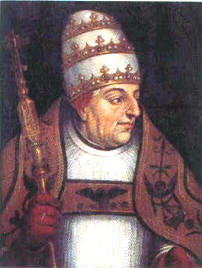|
|
 Borgia
poison is almost certain to figure largely in any Renaissance
novel. It does not figure in history. Yet, though hostile
exaggeration and downright lies did much to create it, there was
unfortunately, some basis in fact for the miasma of scandal
which surrounds the name of Alexander VI. Borgia
poison is almost certain to figure largely in any Renaissance
novel. It does not figure in history. Yet, though hostile
exaggeration and downright lies did much to create it, there was
unfortunately, some basis in fact for the miasma of scandal
which surrounds the name of Alexander VI.
Rodrigo Borgia Lanzol was born at Xativa in
Spain on January 1, 1431. His mother was the sister of Pope
Calixtus III. A cardinal at twenty-five, Rodrigo reached eagerly
for the ecclesiastical plums his uncle shook down for him. His
eagerness did not extend to ecclesiastical morals. Though
rebuked by Pius II, young Rodrigo continued to live evilly.
Such was the man the cardinals elected in answer
to poor Innocent's plea that they elect a better pope. Yet
Rodrigo's election was hailed by the Romans with enthusiasm.
Alexander VI, as Rodrigo chose to be called, was still a fine
figure of a man when elected at the age of sixty-one. He was
talented, generous, a wise patron of art. He performed the
exterior ceremonies of his office with decorum and dispatched
the routine business of the papacy with ability. He promoted
peace between Spain and Portugal, putting a rein on their fierce
competition for empire by his line of demarcation. He treated
Jewish refugees from Spain with kindness. In Rome he made
considerable improvements and did much for the university.
Alexander had to face a difficult problem when
the French king, Charles VIII, came storming down into Italy to
make good his claim to Naples. It was a touchy moment for
Alexander when the French approached Rome. His enemies--Giuliano
della Revere, the Orsini, Savonarola--clamored for his
deposition as a simoniacal prelate. But Alexander, no fool when
it came to diplomacy, outmaneuvered them all and escaped
scot-free from the French menace. He was not done with
Savonarola. The friar of San Marco continued to denounce
Alexander, but in 1498 the people of Florence turned against him
and put the bold preacher to death.
There was a moment when it looked as if
Alexander might turn over a new leaf. One night his favorite
son, Juan, disappeared after a party. After days of anxious
search, his body, pierced with wounds, was fished from the
Tiber. The grief-stricken old Pope was crushed and gave much
thought to reform. A commission drew up a plan full of promise.
But the mood passed, and soon Alexander was deep in plans to
push his son Caesar's career.
Caesar abandoned the ecclesiastical state
(though a cardinal, he was not a priest) and to him Alexander
allotted the turbulent semi-independent northern section of the
Papal States known as Romagna. Caesar smashed his way into his
duchy and held it with a mixture of skill, energy, and
ruthlessness which made him Machiavelli's idol. But his activity
was in vain. His sickness and the Pope's death were to rob him
of a principality.
After dining at a cardinal's villa the Pope and
Caesar defied the treacherous night air of a Roman August. Soon
both were down with malaria. Caesar managed to pull through, but
Alexander, now seventy-three, succumbed. It was six o'clock on
August 13 that Alexander VI went to meet Him as his judge Whose
vicar on earth he had been.
Excerpted from "Popes
Through the Ages" by Joseph Brusher, S.J.
  
|

